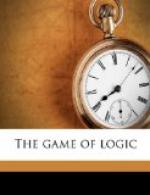But if, in the above example, the writer had drawn the Conclusion “All misers are selfish” (that is, “All y are x"), this would be going beyond his legitimate rights (since it would assert the existence of y, which is not contained in the Premisses), and you would very properly say “Fallacious Conclusion!”
Now, when you read other treatises on Logic, you will meet with various kinds of (so-called) ‘Fallacies’ which are by no means always so. For example, if you were to put before one of these Logicians the Pair of Premisses
“No honest men cheat;
No dishonest men are trustworthy.”
and were to ask him what Conclusion followed, he would probably say “None at all! Your Premisses offend against two distinct Rules, and are as fallacious as they can well be!” Then suppose you were bold enough to say “The Conclusion is ’No men who cheat are trustworthy’,” I fear your Logical friend would turn away hastily—perhaps angry, perhaps only scornful: in any case, the result would be unpleasant. I advise you not to try the Experiment!
“But why is this?” you will say. “Do you mean to tell us that all these Logicians are wrong?” Far from it, dear Reader! From their point of view, they are perfectly right. But they do not include, in their system, anything like all the possible forms of Syllogisms.
They have a sort of nervous dread of Attributes beginning with a negative particle. For example, such Propositions as “All not-x are y,” “No x are not-y,” are quite outside their system. And thus, having (from sheer nervousness) excluded a quantity of very useful forms, they have made rules which, though quite applicable to the few forms which they allow of, are no use at all when you consider all possible forms.
Let us not quarrel with them, dear Reader! There is room enough in the world for both of us. Let us quietly take our broader system: and, if they choose to shut their eyes to all these useful forms, and to say “They are not Syllogisms at all!” we can but stand aside, and let them Rush upon their Fate! There is scarcely anything of yours, upon which it is so dangerous to Rush, as your Fate. You may Rush upon your Potato-beds, or your Strawberry-beds, without doing much harm: you may even Rush upon your Balcony (unless it is a new house, built by contract, and with no clerk of the works) and may survive the foolhardy enterprise: but if you once Rush upon your Fate—why, you must take the consequences!
CHAPTER II.
Cross questions.
“The Man in the Wilderness
asked of me
‘How many strawberries grow in the
sea?’”
__________
1. Elementary.
1. What is an ‘Attribute’? Give examples.
2. When is it good sense to put “is” or “are” between two names? Give examples.




